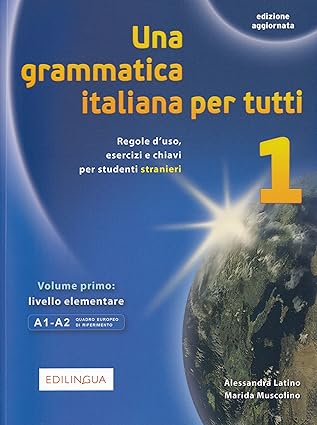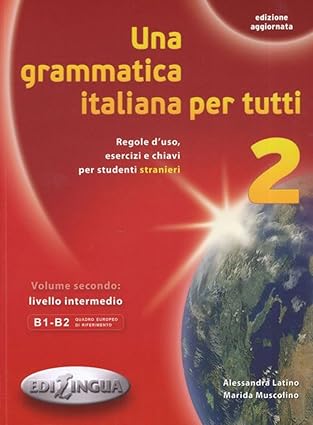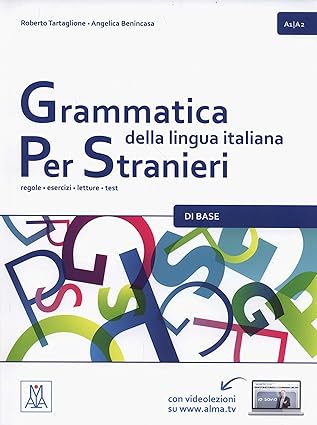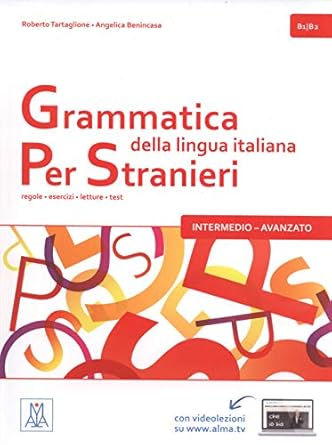Learn Italian Grammar: Direct speech is what someone says while Indirect speech is what is said when referring to what someone else said.
D.D). Valentina disse: “oggi non mi sento bene” D.S). Valentina said: “I don’t feel well today”
D.I). Valentina disse che quel giorno non si sentiva bene. I.S). Valentina said that she wasn’t feeling well that day.
Discorso diretto (D.D) = direct speech (D.S). Discorso indiretto (D.I) = Indirect speech (I.S).
TRANSITION FROM DIRECT SPEECH TO INDIRECT SPEECH In the transition from direct speech to indirect speech, there are transformations relating to those linguistic elements that are influenced by a change in temporal and spatial perspective.
Learn Italian Grammar
1. Learn Italian Grammar: Actions depend on a main verb in the present tense. If the main verb is in the present tense, or in the past linked to the present, in the transition from direct speech (D.D) to indirect speech (D.I) change:
A). Personal pronouns (io, tu, noi, voi) if they do not refer to the narrator. Learn Italian Grammar: Direct And Indirect Speech In Italian.
(D.D) Rita dice: “Così io non avrò nessuno con cui parlare quando non ci siete voi”. (D.S) Rita says: “So I won’t have anyone to talk to when you’re not around”.
(D.I) Rita dice che così lei non avrà nessuno con cui parlare quando non ci sono loro. (I.S) Rita says that this way she won’t have anyone to talk to when they’re not around.
B). Possessives (mio, nostro, tuo, vostro) if they don’t refer to the narrator. mio/tuo suo nostro/vostro loro
Learn Italian Grammar: Direct And Indirect Speech In Italian.
(D.D) Rita dice: “Il conducente ha firmato la denuncia in mia presenza”. (D.S) Rita says: “The driver signed the complaint in my presence”.
(D.I) Rita dice che Il conducente ha firmato la denuncia in sua presenza. (I.S) Rita says that the driver signed the complaint in her presence.
Learn Italian Grammar: Direct And Indirect Speech In Italian.
(D.D) Rita dice loro: “Non preoccupatevi per me!”. (D.S) Rita tells them: “Don’t worry about me!”.
(D.I) Rita dice loro di non preoccuparsi per lei. (I.S) Rita tells them not to worry about her.
2. Learn Italian Grammar: Actions depend on a main verb in the past tense.
If the main verb is in the past tense, not linked to the present (present perfect, historical past, imperfect), in the transition from direct speech (D.D) to indirect speech (D.I) change:
A). Personal pronouns (io, tu, noi, voi) if they do not refer to the narrator. Learn Italian Grammar: Direct And Indirect Speech In Italian.
(D.D) Rita ha detto: “Così io non avrò nessuno con cui parlare quando non ci siete voi”. (D.S) Rita said: “So I won’t have anyone to talk to when you’re not around”.
(D.I) Rita ha detto che così lei non avrebbe avuto nessuno con cui parlare quando non c’erano loro. (I.S) Rita said that then she would have no one to talk to when they weren’t around.
B). Possessives (mio, nostro, tuo, vostro) if they don’t refer to the narrator. mio/tuo suo nostro/vostro loro
Learn Italian Grammar: Direct And Indirect Speech In Italian.
(D.D) Rita ha detto: “Il conducente ha firmato la denuncia in mia presenza”. (D.S) Rita said: “The driver signed the complaint in my presence”.
(D.I) Rita ha detto che Il conducente aveva firmato la deuncia in sua presenza. (I.S) Rita said that the driver had signed the complaint in her presence.
C).The adverb of place.
Learn Italian Grammar: Direct And Indirect Speech In Italian.
(D.D) Carla ha detto: “Non so come farò a stare tanto tempo qui”. (D.S) Carla said: “I don’t know how I’m going to stay here so long”.
(D.I) Carla ha detto che non sapeva come avrebbe fatto a stare tanto tempo lì. (I.S) Carla said she didn’t know how she was going to stay there for so long.
Learn Italian Grammar: Direct And Indirect Speech In Italian.
(D.D) Carla ha detto: “Non so come farò a stare tanto in questo ambiente”. (D.S) Carla said: “I don’t know how I’m going to stay in this environment for so long”.
(D.I) Carla ha detto che non sapeva come avrebbe fatto a stare tanto tempo in quell’ambiente. (I.S) Carla said she didn’t know how she was going to stay so long in that environment.
E). Adverbs of time.
ora allora/ in quel momento oggi quel giorno domani il giorno dopo ieri il giorno prima
Learn Italian Grammar: Direct And Indirect Speech In Italian.
(D.D) Rita ha detto: “Ora ringrazio il cielo per come sono andate le cose”. (D.S) Rita said: “Now I thank heaven for how things turned out”.
(D.I) Rita ha detto che allora ringraziava il cielo per come erano andate le cose. (I.S) Rita said that at that time she was thankful for the way things had gone.
(D.D) Carla ha detto: “Ora sto bene”. (D.S) Carla said: “Now I’m fine”.
(D.I) Carla ha detto che in quel momento stava bene. (I.S) Carla said she was fine at that moment.
(D.D) Carla ha detto: “Oggi mi ha fatto compagnia una ragazza della mia età”. (D.S) Carla said: “Today a girl my age kept me company”.
(D.I) Carla ha detto che quel giorno le aveva fatto compagnia una ragazza della sua età. (I.S) Carla said that a girl of her age had kept her company that day.
(D.D) Carla ha detto: “Però domani la ragazza uscirà”. (D.S) Carla said: “But tomorrow the girl will go out”.
(D.I) Carla ha detto che però il giorno dopo la ragazza sarebbe uscita. (I.S) Carla said that the girl would go out the next day.
(D.D) Carla ha detto: “Ieri Rita ha avuto un incidente d’auto”. (D.S) Carla said: “Yesterday Rita had a car accident”.
(D.I) Carla ha detto che il giorno prima Rita aveva avuto un incidente d’auto. (I.S) Carla said that the day before Rita had been in a car accident.
Learn Italian Grammar: Direct And Indirect Speech In Italian.
(D.D) Il medico ha detto: “Fra un mese circa, la ragazza potrà tornare a casa”. (D.S) The doctor said: “In about a month, the girl will be able to go home”.
(D.I) Il medico ha detto che dopo un mese circa, la ragazza sarebbe potua tornare a casa. (I.S) The doctor said that after about a month, the girl would be able to go home.
present indicative/subjunctive imperfect indicative/subjunctive.
Learn Italian Grammar: Direct And Indirect Speech In Italian.
(D.D) Anna ha detto: “Nel complesso sto bene”. (D.S) Anna said: “Overall I’m fine.”
(D.I) Anna ha detto che nel complesso stava bene. (I.S) Anna said that overall she was fine.
(D.D) Carla ha detto: “Immagino questa idea non le piaccia”. (D.S) Carla said: “I guess you don’t like this idea”.
(D.I) Carla ha detto che immaginava che quell’idea non le piacesse. (I.S) Carla said she imagined she didn’t like that idea.
future and the conditional (present) past conditional
Learn Italian Grammar: Direct And Indirect Speech In Italian.
(D.D) Anna ha detto: “Non so come farò a resistere”. (D.S) Anna said: “I don’t know how I’m going to resist”.
(D.I) Anna ha detto che non sapeva come avrebbe fatto a resistere. (I.S) Anna said she didn’t know how she was going to resist.
(D.D) Anna ha detto: “Vorrei vedere tutti gli amici”. (D.S) Anna said: “I would like to see all the friends”.
(D.I) Anna ha detto che avrebbe voluto vedere tutti gli amici. (I.S) Anna said she would like to see all her friends.
I). The perfect (present , historical), and the past subjunctive . perfect and past subjunctive indicative/ subjunctive past perfect
Learn Italian Grammar: Direct And Indirect Speech In Italian.
(D.D) Il conducente ha detto: “Ho tentato di frenare, ma non ci sono riuscito”. (D.S) The driver said, “I tried to brake, but I couldn’t.”
(D.I) Il conducente ha detto che aveva tentato di frenare, ma non c’era riuscito. (I.S) The driver said he tried to brake, but couldn’t.
(D.D) Rita ha detto: ” Il conducente dichiarò alla polizia che la colpa era solo sua”. (D.S) Rita said: “The driver told the police that it was his fault alone.”
(D.I) Rita ha detto che il conducente aveva dichiarato alla polizia che la colpa era solo sua. (I.S) Rita said the driver had told the police that it was his fault alone.
(D.D) Il medico ha detto: “Non sembra che il colpo abbia prodottp danni gravi”. (D.S) The doctor said, “It doesn’t appear that the shot did any serious damage.”
(D.I) Il medico ha detto che non sembrava che il colpo avesse prodotto danni gravi. (I.S) The doctor said that the blow did not appear to have caused any serious damage.
Learn Italian Grammar: Direct And Indirect Speech In Italian.
(D.D) Rita ripeteva loro: “Non preoccupatevi per me!”. (D.S) Rita kept repeating to them: “Don’t worry about me!”.
(D.I) Rita ripeteva loro di non preoccupatesi per lei. (I.S) Rita kept telling them not to worry about her.
(D.D) Il medico ha detto a Rita: “Stia tranquilla per sua sorella”. (D.S) The doctor told Rita: “Don’t worry about your sister”.
(D.I) Il medico ha detto a Rita di stare tranquilla per sua sorella. (I.S) The doctor told Rita to stay calm for her sister.
K). Verb venire. Learn Italian Grammar: Direct And Indirect Speech In Italian.
(D.D) Anna ha detto a Rita: “Di’ a tutti gli amici di venire a trovarmi!”. (D.S) Anna said to Rita: “Tell all my friends to come and see me!”.
(D.I) Anna ha detto a Rita di dire a tutti gli amici di andare a trovarla. (I.S) Anna told Rita to tell all her friends to visit her.
L). Verbs that depend on ask and request. present indicative imperfect indicative or subjunctive present perfect/past historical indicative or subjunctive past perfect
Learn Italian Grammar: Direct And Indirect Speech In Italian.
(D.D) Carla ha chiesto a Rita: “Qual è la prognosi?”. (D.S) Carla asked Rita: “What is the prognosis?”.
(D.I) Carla ha chiesto a Rita quale fosse (era) la prognosi. (I.S) Carla asked Rita what the prognosis was (was).
(D.D) Carla ha chiesto a Rita: “Hai avvertito Giulio che mi trovo in ospedale?”. (D.S) Carla asked Rita: “Did you tell Giulio that I’m in the hospital?”.
(D.I) Carla ha chiesto a Rita se avesse avvertito (aveva avvertito) Giulio che si trovava in ospedale. (I.S) Carla asked Rita if she had warned (she had warned) Giulio that he was in the hospital.
Note:
If in direct speech there is a verb in the future, in indirect speech it becomes past conditional.
Learn Italian Grammar: Direct And Indirect Speech In Italian.
(D.D) Chiesi a Maria: “quando tornerà Paolo?”. (D.S) I asked Maria: “When will Paul be back?”.
(D.I) Chiesi a Maria quando sarebbe tornato Paolo. (I.S) I asked Maria: “When will Paul be back?”.
(D.D) Chiesi a Lucia: “Verrà anche Giulio?”. (D.S) I asked Lucia: “Will Giulio come too?”.
(D.I) Chiesi a Lucia se sarebbe venuto anche Giulio. (I.S) I asked Lucia if Giulio would also come.
Amazon ad:
An Italian grammar for everyone 1: rules, exercises, and answer keys | A1 – A2
An Italian grammar for everyone 2: rules, exercises, and answer keys | B1 – B2
Italian Grammar for Foreigners: rules, reading, exercises, and answer keys | A1 – A2
Italian Grammar for Foreigners: rules, reading, exercises, and answer keys | B1 – B2
Learn Italian Grammar: in the transition from direct speech to indirect speech do not change:
1. The personal pronouns lui,lei, loro: Learn Italian Grammar: Direct And Indirect Speech In Italian.
(D.D) Rita ha detto: “Lui ha firmato la denuncia in mia presenza”. (D.S) Rita said: “He signed the complaint in my presence”.
(D.I) Rita ha detto che lui aveva firmato la denuncia in sua presenza. (I.S) Rita said that he had signed the complaint in her presence.
(D.D) Anna ha detto: “Di’ a loro di venire a trovarmi!”. (D.S) Anna said: “Tell them to come and see me!”.
(D.I) Anna ha detto di dire a loro di andare a trovarla. (I.S) Anna said to tell them to go and see her.
2. Possessives suo and loro :
Learn Italian Grammar: Direct And Indirect Speech In Italian.
(D.D) Carla ha detto: “Al momento dell’incidente, accanto ad Anna c’era anche sua sorella”. (D.S) Carla said: “At the time of the accident, her sister was also next to Anna”.
(D.I) Carla ha detto che al momento dell’incidente, accanto ad Anna c’era anche sua sorella. (I.S) Carla said that at the time of the accident, her sister was also next to Anna.
(D.D) Anna ha detto: “La loro presenza mi farà sentire meno infelice”. (D.S) Anna said: “Their presence will make me feel less unhappy.”
(D.I) Anna ha detto che la loro presenza l’avrebbe fatta sentire meno infelice. (I.S) Anna said their presence would make her feel less unhappy.
3). The adverb of place.
Learn Italian Grammar: Direct And Indirect Speech In Italian.
(D.D) Rita ha detto: “Vado lì (là) ogni volta che posso”. (D.S) Rita said: “I go there (there) whenever I can.”
(D.I) Rita ha detto che andava lì (là) ogni volta che poteva. (I.S) Rita said that she went there (there) whenever she could.
4). The demonstrative quello
Learn Italian Grammar: Direct And Indirect Speech In Italian.
(D.D) Carla ha chiesto: “Con tutte quelle ferite, Anna soffre molto?”. (D.S) Carla asked: “With all those wounds, does Anna suffer a lot?”.
(D.I) Carla ha chiesto se con tutte quelle ferite, Anna soffrisse molto. (I.S) Carla asked if Anna was in a lot of pain with all those wounds.
5). Adverbs of time.
allora allora in quel momento in quel momento
Learn Italian Grammar: Direct And Indirect Speech In Italian.
(D.D) Lui ha detto: “Allora I freni non hanno funzionato come al solito”. (D.S) He said: “Then the brakes didn’t work as usual”.
(D.I) Lui ha detto che allora I freni non avevano funzionato come al solito. (I.S) He said that then the brakes hadn’t worked as usual.
(D.D) Carla ha detto: “In quel momento c’era anche Rita”. (D.S) Carla said: “Rita was also there at that moment”.
(D.I) Carla ha detto che in quel momento c’era anche Rita. (I.S) Carla said that Rita was also at that moment.
6). Expressions of time. quel giorno quel giorno il giorno prima il giorno prima il giorno dopo il giorno dopo
Learn Italian Grammar: Direct And Indirect Speech In Italian.
(D.D) Carla ha detto: “Quel giorno Anna ha avuto un incidente d’auto”. (D.S) Carla said: “That day Anna had a car accident”.
(D.I) Carla ha detto che quel giorno Anna aveva avuto un incidente d’auto. (I.S) Carla said that Anna had been in a car accident that day.
(D.D) Carla ha detto: “Il giorno prima c’eravamo uscite insieme”. (D.S) Carla said: “The day before we went out together”.
(D.I) Carla ha detto che il giorno prima erano uscite insieme. (I.S) Carla said that they had gone out together the day before.
(D.D) Carla ha detto: “Ho saputo dell’incidente solo il giorno dopo”. (D.S) Carla said: “I only learned about the accident the day after”.
(D.I) Carla ha detto che aveva saputo dell’incidente solo il giorno dopo. (I.S) Carla said that she only found out about the accident the next day.
7). The imperfect (indicative and subjunctive) imperfect indicative/subjunctive imperfect indicative/subjunctive
Learn Italian Grammar: Direct And Indirect Speech In Italian.
(D.D) Rita ha detto: “Mentre Anna attraversava sulle strisce, una macchina l’ha investita”. (D.S) Rita said: “While Anna was crossing the crossroads, a car hit her”.
(D.I) Rita ha detto che mentre Anna attraversava sulle strisce, una macchina l’aveva investita. (I.S) Rita said that while Anna was crossing on the crosswalk, a car had run over her.
(D.D) Rita ha detto: “Carla mi ha chiesto quale fosse la prognosi”. (D.S) Rita said, “Carla asked me what the prognosis was.”
(D.I) Rita ha detto che Carla le aveva chiesto quale fosse la prognosi. (I.S) Rita said that Carla had asked her about the prognosis.
8). The past conditional. past conditional past conditional
(D.D) Rita ha detto: “Secondo il conducente, i freni non avrebbero funzionato come al solito”. (D.S) Rita said: “According to the driver, the brakes would not have worked as usual.”
(D.I) Rita ha detto che secondo il conducente, i freni non avrebbero funzionato come al solito. (I.S) Rita said that according to the driver, the brakes would not work as usual.
9). The indicative/ subjunctive past perfect. indicative/ subjunctive past perfect indicative/ subjunctive past perfect
Learn Italian Grammar: Direct And Indirect Speech In Italian.
(D.D) Rita ha detto: “Avevo avvertito Giulio, prima che Anna me lo chiedesse”. (D.S) Rita said: “I warned Giulio, before Anna asked me to”.
(D.I) Rita ha detto che avevo avvertito Giulio, prima che Anna glielo chiedesse. (I.S) Rita said I warned Giulio before Anna asked.
(D.D) Rita ha detto: “Anna mi ha chiesto se avessi avvertito Giulio”. (D.S) Rita said: “Anna asked me if I had warned Giulio”.
(D.I) Rita ha detto che Anna le aveva chiesto se avesse avvertito Giulio. (I.S) Rita said that Anna had asked her if she had warned Giulio.
10). The indefinite moods infinitive infinitive gerund gerund participle participle
Learn Italian Grammar: Direct And Indirect Speech In Italian.
(D.D) Lui ha detto: “Ho tentato di frenare, ma non ci sono riusciuto”. (D.S) He said: “I tried to brake, but I couldn’t”.
(D.I) Lui ha detto che aveva tentato di frenare, ma non c’era riuscito. (I.S) He said that he had tried to brake, but he hadn’t succeeded.
(D.D) Il medico ha detto: “Cadendo a terra, la ragazza ha battuto la testa”. (D.S) The doctor said: “When she fell to the ground, the girl hit her head.”
(D.I) Il medico ha detto che cadendo a terra, la ragazza aveva battuto la testa. (I.S) The doctor said that when she fell to the ground, the girl had hit her head.
(D.D) Carla ha detto: “Appena appresa la notizia, sono corsa all’ospedale”. (D.S) Carla said: “As soon as I heard the news, I ran to the hospital”.
(D.I) Carla ha detto che appena appresa la notizia, era corsa all’ospedale. (I.S) Carla said that as soon as she heard the news, she ran to the hospital.
11). The verb andare
Learn Italian Grammar: Direct And Indirect Speech In Italian.
(D.D) Anna ha detto: “Ringrazio il cielo per come sono andate le cose”. (D.S) Anna said: “I am thankful for the way things turned out”.
(D.I) Anna ha detto che ringraziava il cielo per come erano andate le cose. (I.S) Anna said she was thankful for the way things had gone.




